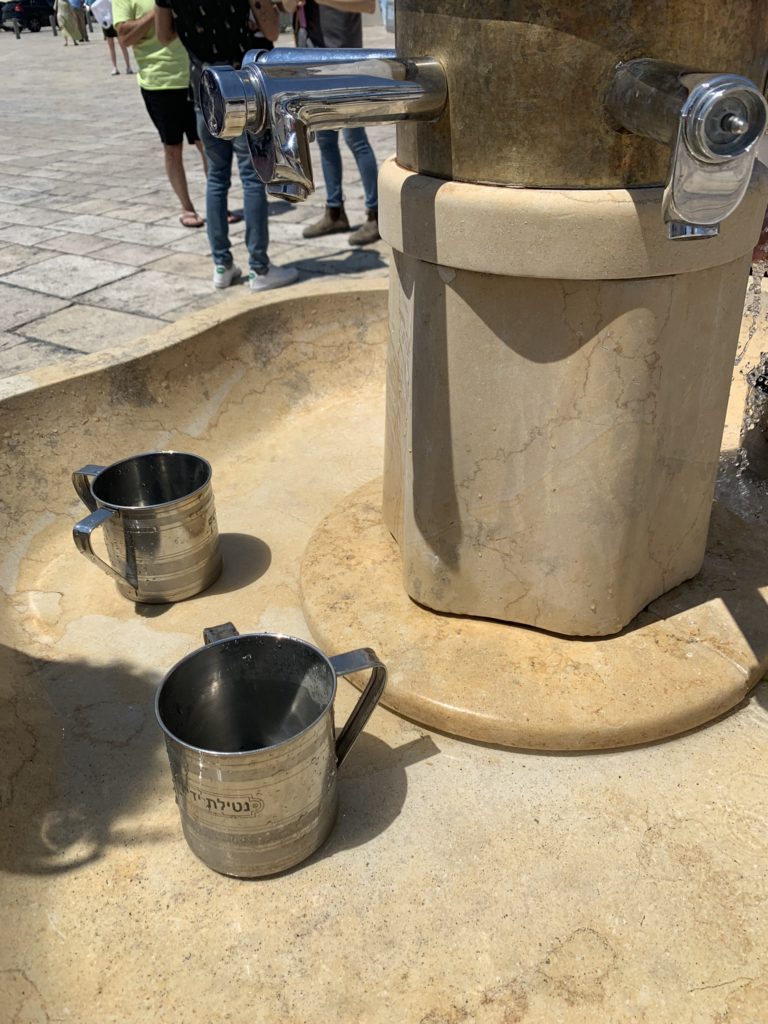“The Pharisees and all the Jews do no eat unless they give their hands a ceremonial washing, holding to the tradition of their elders. When they come from the marketplace they do not eat unless they wash. And they observe many other traditions, such as the washing of cups, pitchers and kettles.” (Mark 7:3-4 NIV)

The Pharisees washed and washed their hands: after the market, before a meal containing bread, after eating bread, before eating dipped fruit or vegetables, before worship, before the priestly blessing, after sleeping, after touching oneself (private parts, back, armpits, inside of nose or ear, scalp, sweat or shoes). They’d wash their hands upon leaving a bathroom or a cemetery and after sex or a funeral. They were a bit obsessive about hand washing.
The Pharisees had taken God’s instruction of cleanliness and construed it into a law with many moving parts. Something that was designed to protect from disease became a burden that many could not afford to indulge in. How would fishermen wash their hands amid an evening’s work? Or a farmer in the fields in the thick of harvest? Workers must eat to keep up their strength for the task at hand. Pharisees who sat in high places far-removed from manual labor would not understand the weight of these extra legalities.
I don’t believe Jesus was anti-handwashing. He was just hard at work. The law about clean hands before bread consumption included an allowance for up to a four mile walk to obtain water for required handwashing. Imagine the potential interruptions in Jesus’ short but potent ministry. On the hillside with the loaves and fishes – “Hang on you guys, let Me quick make an eight mile jaunt to wash My hands before I serve supper.” We also need to note that these weren’t God’s laws, but extra rules added on by man over the millennia since Moses had received the commandments on Mount Sinai.
Jesus points out the far more troubling issue:
“He replied, “Isaiah was right when he prophesied about you hypocrites; as it was written: These people honor Me with their lips but their hearts are far from Me. They worship Me in vain; their teachings are merely human rules. You have let go of the commands of God and are holding on to human traditions.”” (Mark 7:6-8 NIV)
The Pharisees could wash their hands a hundred times a day, but their hearts were still dirty. Their hands were clean, but their souls were untouched by the transformative power of God’s presence. They had the appearance of godliness, but none of the inward implications. The disciples, however filthy in appearance, were walking with the living God, getting to know Him and allowing His words to transform their inner lives.
What does this text say to us today, in a season where hand washing has been so strongly encouraged? Our hands are clean, but what about our hearts? We spend a lot of time fixating on external and temporary, but what about eternal? What if we used hand washing as an opportunity to soul-search as well? Twenty seconds of vigorous scrubbing is enough to kill the virus, what could we accomplish internally in that same amount of time?

“Come near to God and He will come near to You. Wash your hands you sinners, and purify your hearts, you double-minded.” (James 4:8 NIV)
Lord, please help us as we are so diligent about handwashing but maybe not so good at soul-searching. You remind us that the heart condition matters most. May we differentiate between the rules of man and the heart of God. We want to honor You with our thoughts and actions. Please purify us from the inside out as only You can. Amen.